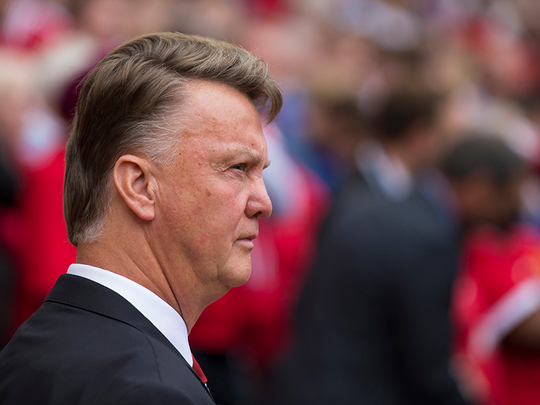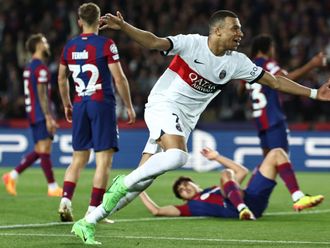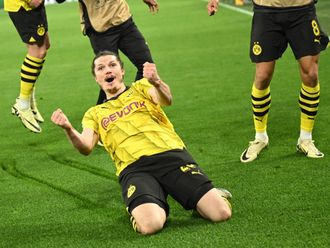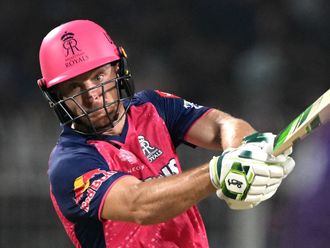
London: Louis van Gaal's academic and sometimes overbearing management style has tended to test the patience of modern players. There were clear sings of restiveness in the Manchester United squad as players contemplated a third season of headmasterly control and some considered leaving this summer.
The willingness of United's players to go along with Van Gaal's professorial approach was stretched when he sent them tactical emails which sometimes went unread. Van Gaal, though, could tell when his messages had remained unopened.
For months there had been grumbling about the volume of meetings and tide of information and instructions. United, remember, had already seen off one manager who diverged from the traditional template in training and games.
David Moyes was thought to be "too Everton" in his approach, prolonging tactical drills and turning the final training session of the week into a highly structured exercise. Under Sir Alex Ferguson, the last pre-match run-out tended to emphasise instinct and free expression. Strikers were told to hit the ball first time and players were encouraged to feel the opposition would be in dire trouble when the game kicked off.
This pumping up of the United ego was a deliberate ploy to encourage enterprising play. Under Moyes, the players disliked having those fires dampened. And while Van Gaal brought a much better CV to the United job, his approach was even more prescriptive.
Defenders were told how far to stand from one another and players were ordered to remain in set positions. It was classic Dutch football spatial thinking but was accompanied by slow passing and a preoccupation with possession over penetration.
United's strikers are said to have felt that the ball would move around sideways and backwards in midfield without ever reaching the forward areas.
Although United have been slightly more direct since Christmas, when Van Gaal was on the verge of being sacked, the style of play still depressed the club's supporters and prompted neutrals to switch the television off.
From the start, in an interview with Gary Neville in The Daily Telegraph, Van Gaal expressed his mistrust of players playing "on instinct" and promised to stamp it out. Adnan Januzaj, a free-spirited youngster, was one of the first victims of Van Gaal's controlling urges and was eventually sent to Germany on loan.
As Rio Ferdinand observed at the weekend, Ferguson's United sides never discussed whether they would finish in the Champions League qualifying places. It was simply not an issue. But this has been United's mission for most of this campaign: a quest wholly at odds with Van Gaal's £250m investment in players, few of whom have made the required impact.
In Saturday's FA Cup final there was no trace of half-heartedness on United's part. They earned a hard-fought victory over Crystal Palace in extra-time. Wayne Rooney turned the game by setting up Juan Mata's equaliser. Marcus Rashford, successfully promoted from the academy by Van Gaal, handed over boy-wonder duties to Jesse Lingard, who scored a grand winner. But most of those chosen by Van Gaal at Wembley probably took to the field suspecting their manager would not survive either way.
In that sense they were not battling to keep him in the job. The players recruited by Van Gaal at vast expense placed a clear personal responsibility on the manager to finish no lower than fourth in the Premier League. No longer could he claim to be cleaning up any mess left by Moyes.
Senior administrators at the club were determined to hold him to account for signing Bastian Schweinsteiger, Memphis Depay and Morgan Schneiderlin, who has regressed since leaving Southampton last summer.
Schweinsteiger is thought to have disappointed some at the club with the paucity of his contribution to the team, while Memphis appeared to have adopted a megastar mind-set, turning up to an Under-21 game, allegedly, in his Rolls-Royce, despite the bad impression this would make on his fellow players and United fans.
In some cases - Memphis especially - Van Gaal seems to have either overlooked doubts about a player's temperament or failed to impose himself on them when they arrived. One of his signings is said to have been sent home from the training ground with two boiled eggs, such was his naivety in the kitchen. At least the reservations about Van Gaal did not extend to the diet it itself. When Moyes left, Ferdinand recalled the chip ban imposed at the training ground: "It's not something to go to the barricades over," he wrote. "But all the lads were p****d off."
Ferdinand also spelt out his tactical and other doubts about Moyes. The chips were just a good story. This time the complaints go to the heart of Van Gaal's management ethos, which has its roots in academia rather than the modern multi-millionaire culture.
At Barcelona both Rivaldo and Hristo Stoichkov ended up using Jose Mourinho, United's next manager, as a buffer to keep Van Gaal at bay. In fourth place in the League, Van Gaal might have survived to fight on. But finishing fifth brought dressing-room disharmony into play, and the huge commercial impact of not qualifying for the Champions League.
Mourinho is a highly structured thinker, too, but he is unlikely to repeat Van Gaal's error of turning United into a university project.










